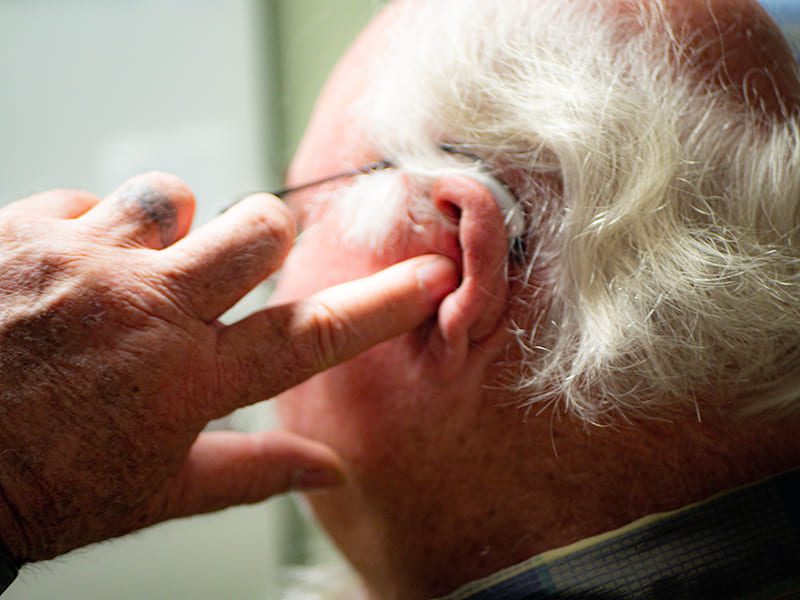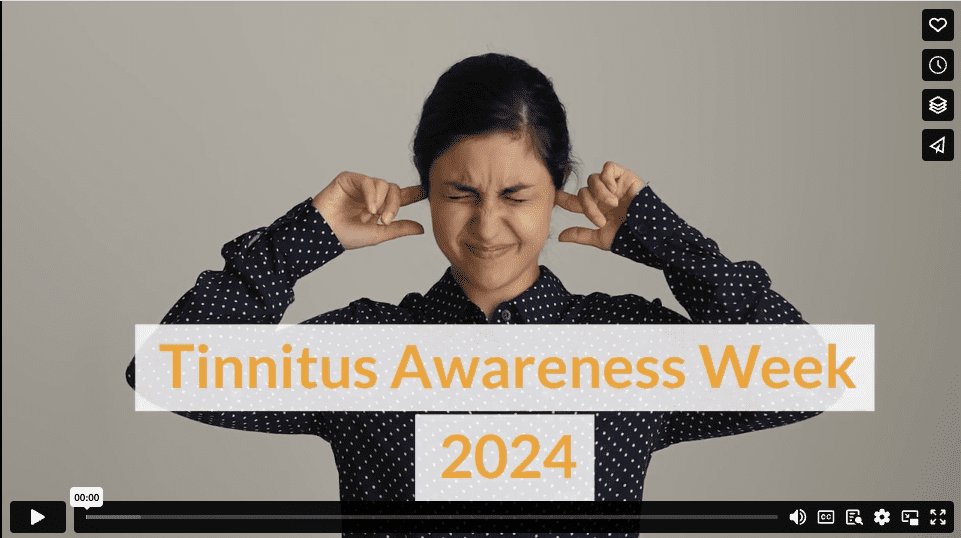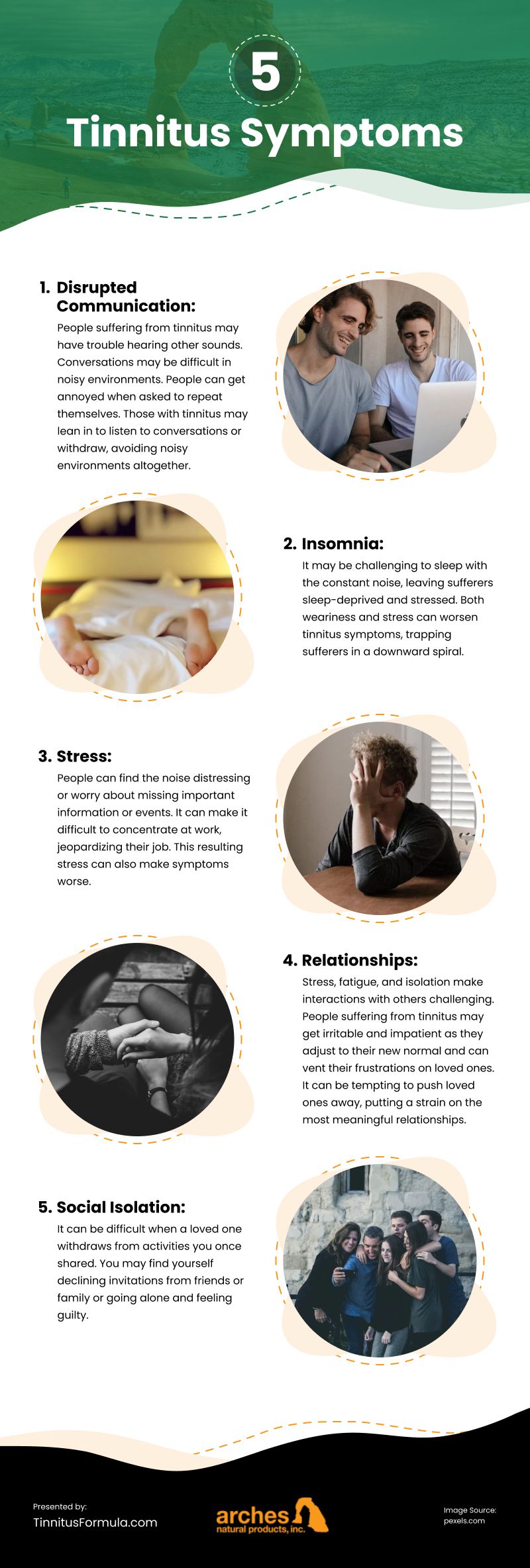By Barry Keate
Barry Keate, has lived with tinnitus over 40 years and has published 150+ research articles on numerous aspects of tinnitus. He is an expert on the condition and a well-known advocate for those with tinnitus.

(Anthony Camerlo/Unsplash)
February 5-11 is Tinnitus Awareness Week, an opportunity to bring awareness to the 10% of Americans who suffer from the condition. It’s a time to urge researchers to continue their efforts to find a cure and learn more about what your loved ones deal with daily.
What is Tinnitus?
Tinnitus is a symptom of nerve damage in the inner ear. Tiny hair-like nerves send messages to the brain about the sounds we hear. When damaged, they send corrupted data to the brain. The person with tinnitus hears sounds for which there is no physical or environmental cause. These sounds are often described as ringing in the ears, but they can also sound like a rushing, popping, roaring, humming, or buzzing sound.
The nerve damage can come from a number of different conditions like high blood pressure, diabetes, autoimmune disorders, hearing loss, and more. It can result from physical injuries to the head or ear, explosive sudden sounds, or loud sounds over long periods.
Is Tinnitus a New Condition?
No. The earliest recorded cases of tinnitus were in Egypt in 3100 B.C. The early Egyptians prayed over the patient and applied tree sap or oils like Frankincense to the affected ear. While our understanding of the condition has evolved over millennia of living with the condition, people still search for ways to deal with or mask the sounds so they can live fulfilling lives.
How Does Tinnitus Affect Individuals?
Some people experience symptoms constantly, while others have them sporadically. The sound can grow louder or diminish. Common outcomes include:
- Disrupted Communication: People suffering from tinnitus may have trouble hearing other sounds. Conversations may be difficult in noisy environments. People can get annoyed when asked to repeat themselves. Those with tinnitus may lean in to listen to conversations or withdraw, avoiding noisy environments altogether.
- Insomnia: It may be challenging to sleep with the constant noise, leaving sufferers sleep-deprived and stressed. Both weariness and stress can worsen tinnitus symptoms, trapping sufferers in a downward spiral.
- Stress: People can find the noise distressing or worry about missing important information or events. It can make it difficult to concentrate at work, jeopardizing their job. This resulting stress can also make symptoms worse.
- Relationships: Stress, fatigue, and isolation make interactions with others challenging. People suffering from tinnitus may get irritable and impatient as they adjust to their new normal and can vent their frustrations on loved ones. It can be tempting to push loved ones away, putting a strain on the most meaningful relationships.
- Social Isolation: It can be difficult when a loved one withdraws from activities you once shared. You may find yourself declining invitations from friends or family or going alone and feeling guilty.
Is There a Cure?
Yes and No. It depends on the underlying cause of the symptoms and the period between the first symptoms and when the patient sought treatment. When the underlying cause is cured or adequately managed, tinnitus symptoms can become quieter or disappear altogether. For example, correcting nutritional deficiencies that cause tinnitus can bring relief. Likewise, tinnitus caused by loud noises, such as a concert, may cause ringing for a time. Your ears may need time to recover but may return to normal in a few days.
The caveat is the nerve must still be alive. Nerve damage left untreated can become permanent when a nerve dies. For many, repeated exposure to loud noises can cause irreversible damage to nerves, causing hearing loss and tinnitus.
How Do You Treat Tinnitus?
The first step is to determine the underlying cause. The cause will determine what treatments may work best in each individual’s case. Some products for tinnitus combine high-grade ginkgo biloba with nutrients like vitamin B and zinc. Natural supplements for tinnitus can correct nutrient deficiencies and improve nerve conductivity and regeneration. Over time, you may experience tinnitus relief as symptoms become more manageable and may even disappear.
Are Researchers Trying to Cure Tinnitus?
Tinnitus isn’t a flashy condition with celebrity spokespeople, but it affects millions of Americans. Research on the causes and potential treatments for the condition are ongoing. Part of the problem with research is that the researchers can’t measure the severity of the condition in their test subjects or the treatment results. They rely solely on the patient’s description of their symptoms and whether treatments are improving the condition. Two study participants may explain the same symptom differently, or one may react to it more strongly than another. The subjective nature of the data is a hindrance.
Machines able to reproduce tinnitus sounds are helping researchers overcome this problem. Patients control the pitch and volume the machine produces, and adjust settings until the sound matches what they are hearing. In doing so, they make the condition measurable, which is a big step forward in finding a cure.
Other researchers are researching the data delivery system from the ear to the brain to see if there is a way to change the corrupted data midstream.
Experimental therapies include tiny electric pulses from electrodes on the scalp meant to calm hypersensitive brain cells that increase background noise. There isn’t any definitive proof this method works yet. It is also possible such treatment could make things worse. Time will tell.
Tinnitus Awareness
For those with tinnitus, learning to live with sounds nobody else can hear is challenging. This Tinnitus Awareness Week, consider what you can do to raise awareness of tinnitus and support the millions living with tinnitus symptoms.
Video

Infographic
Tinnitus is a symptom of nerve damage in the inner ear, causing the person to hear sounds without a physical cause. Symptoms can be constant or sporadic, and the sound may vary in intensity. Find out the common outcomes in this infographic.

Get Free Shipping!
Order now and get free shipping on either the Tinnitus Starter Kit or Combo Pack. Try the doctor recommended products with clinically proven ingredients for tinnitus. No coupon code required.

